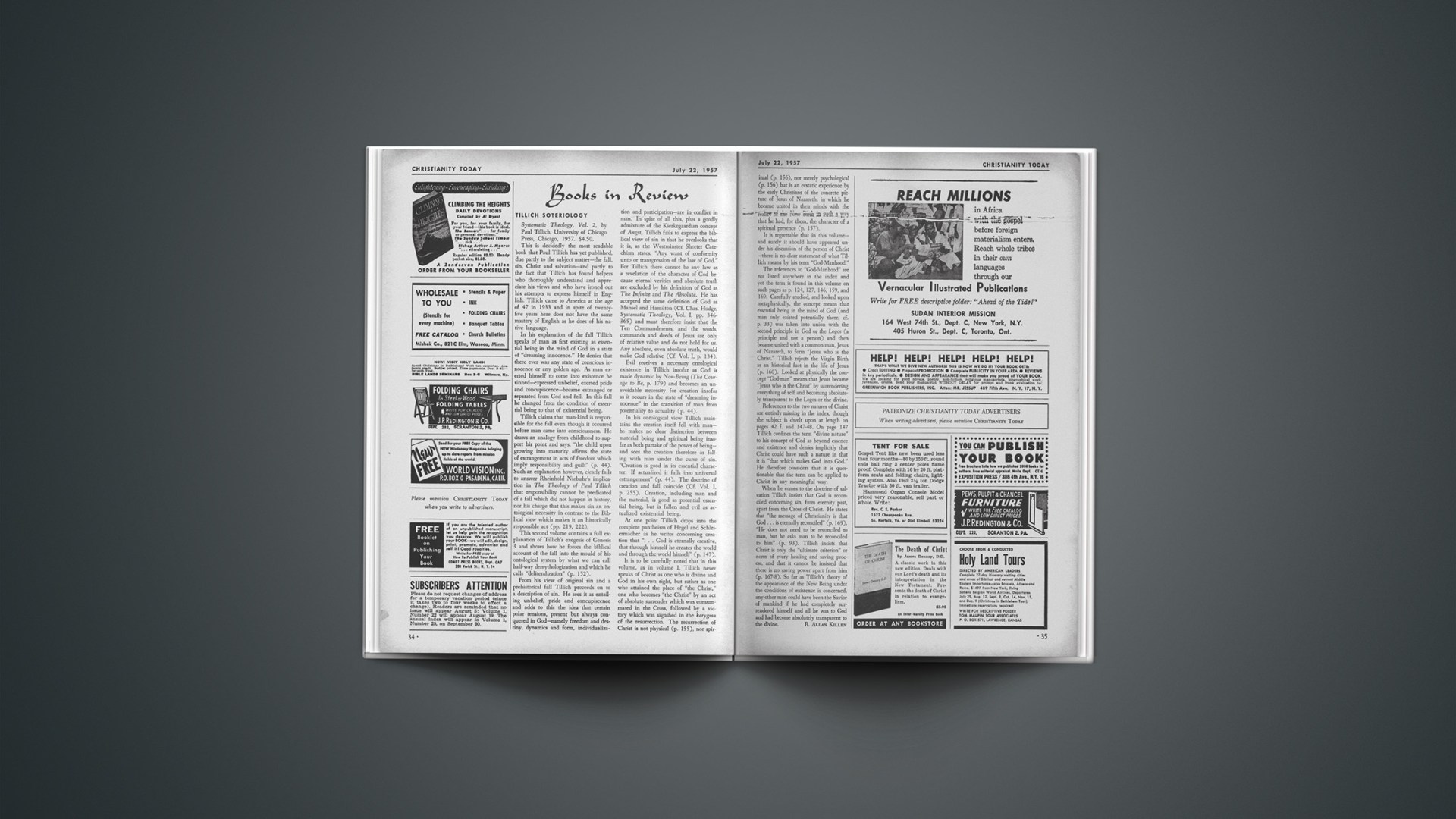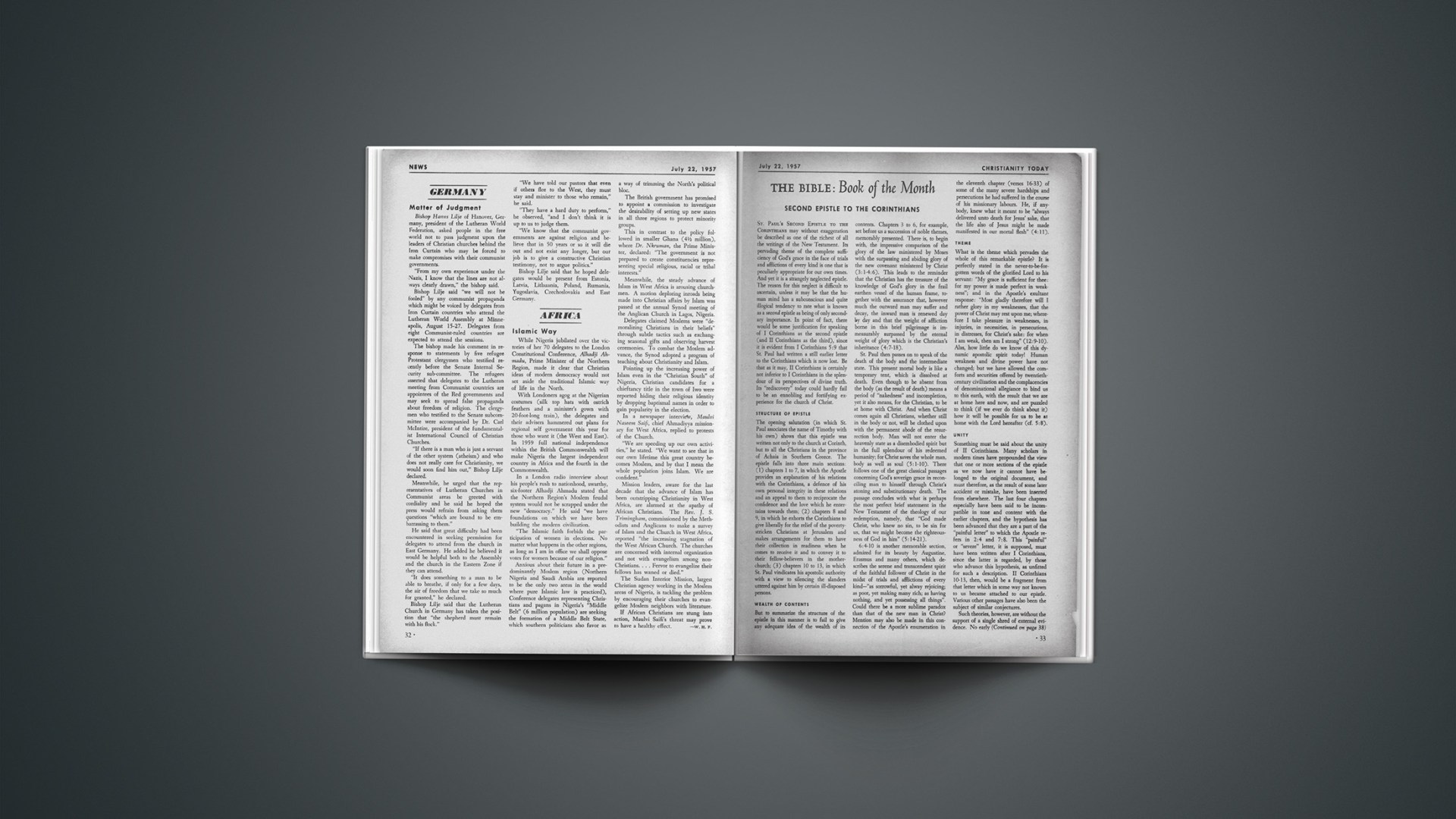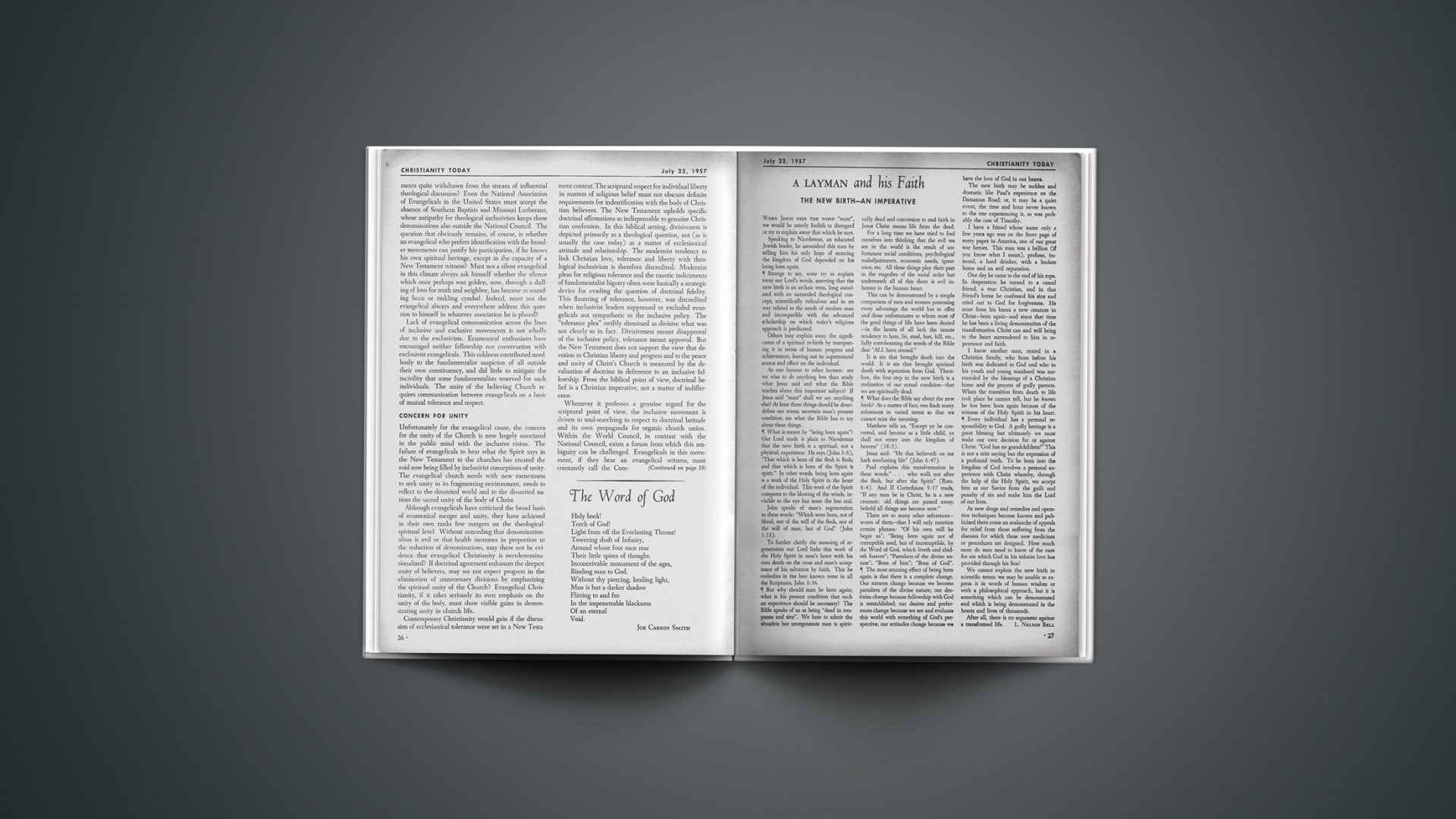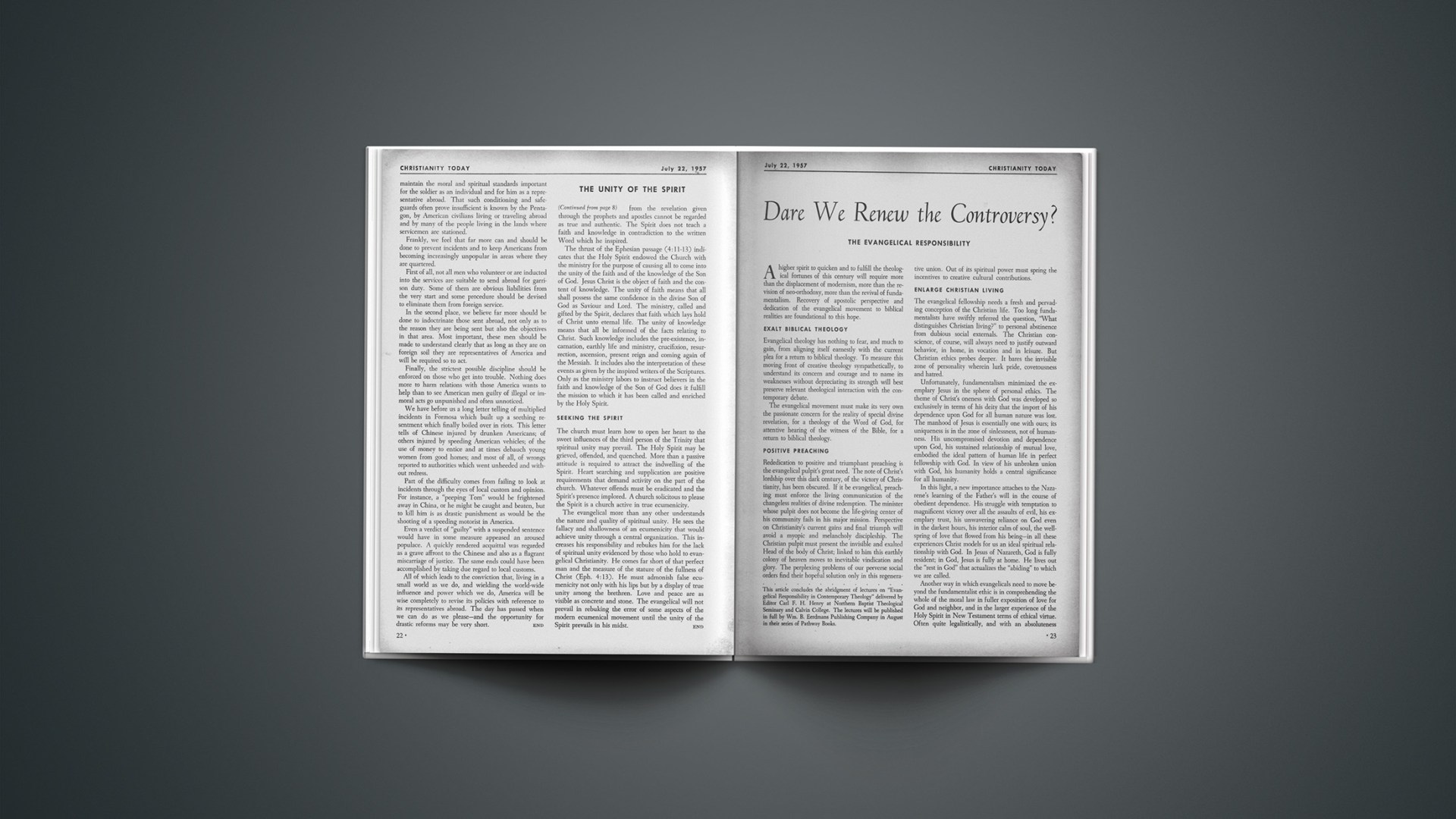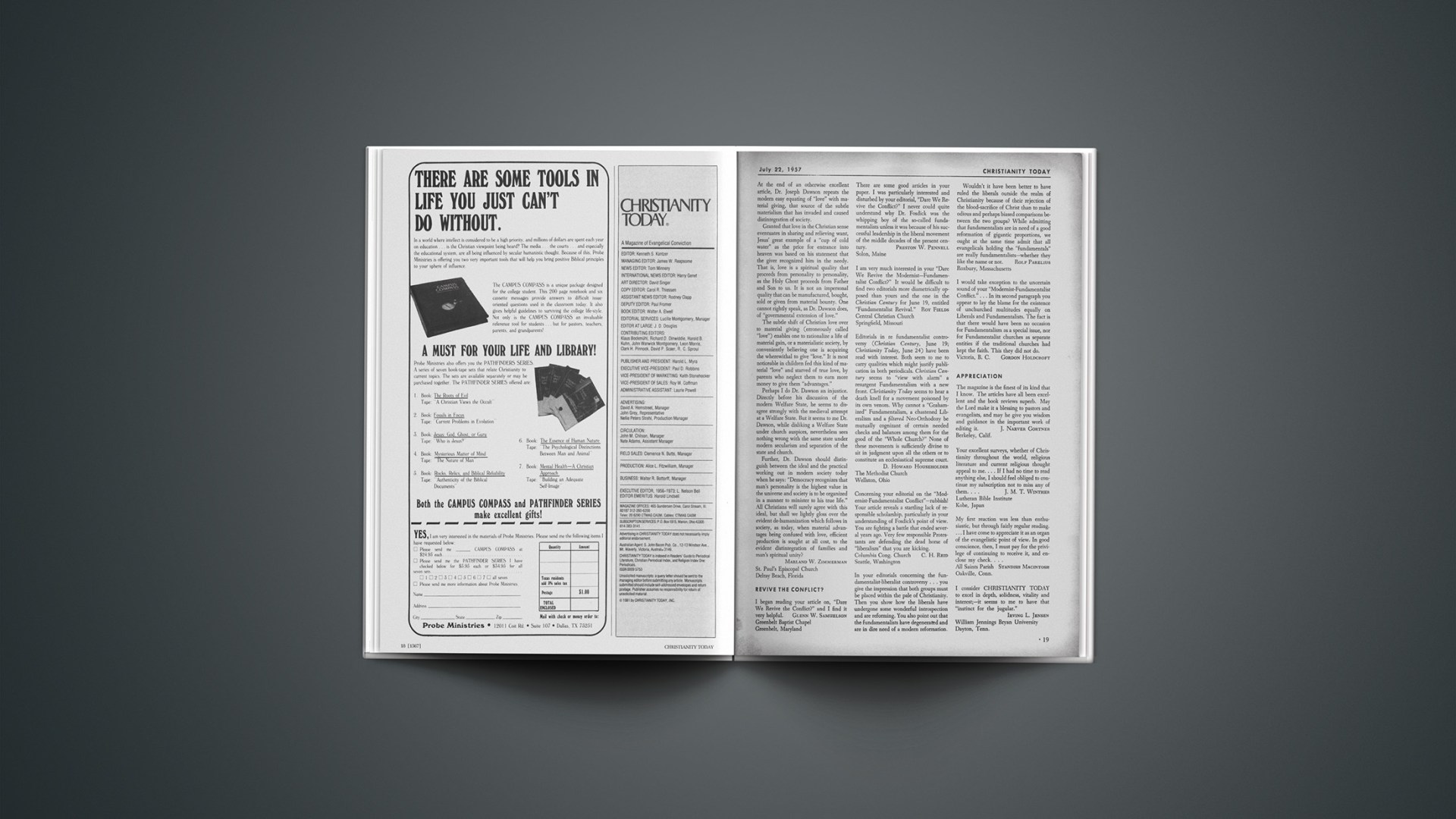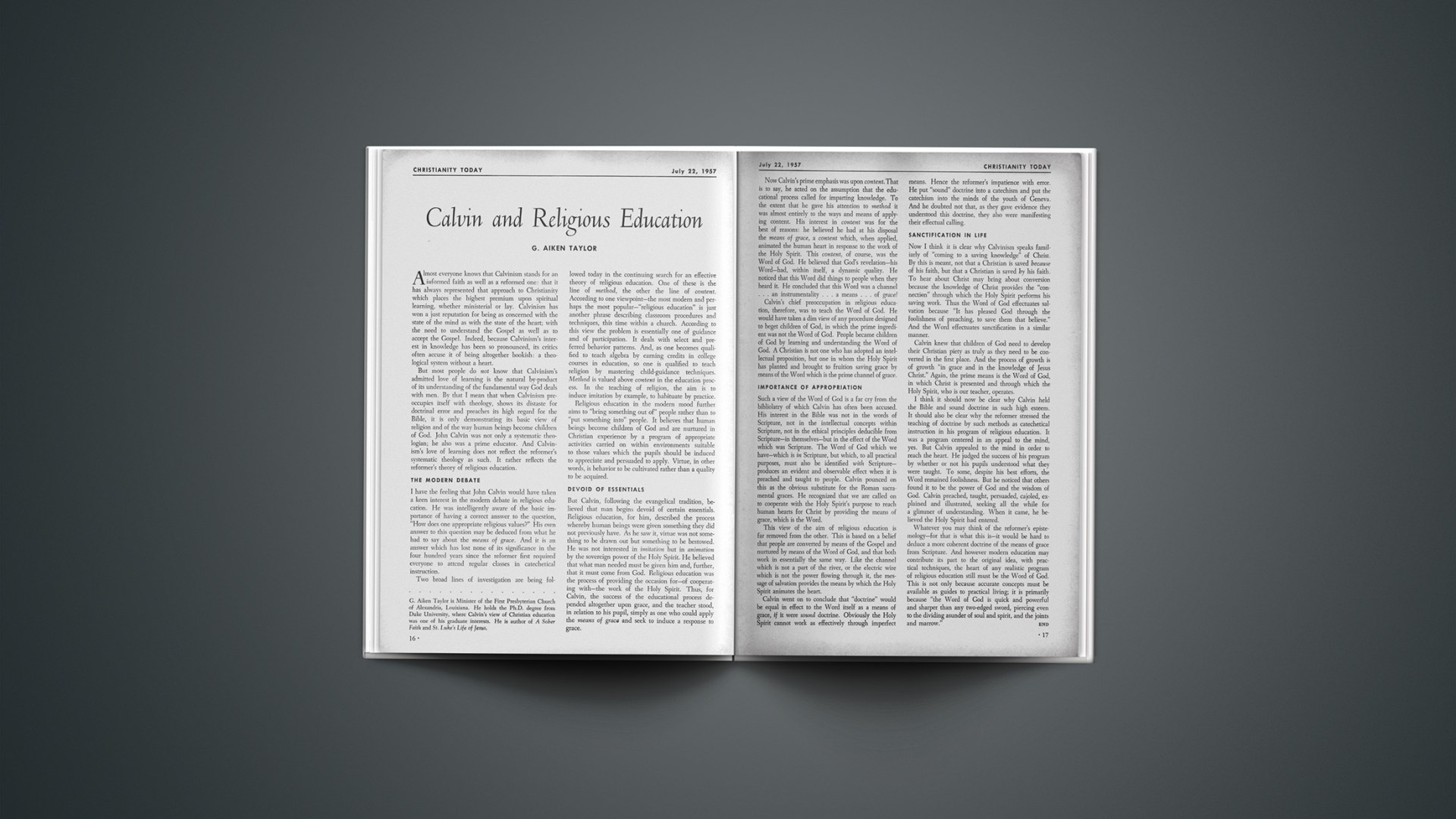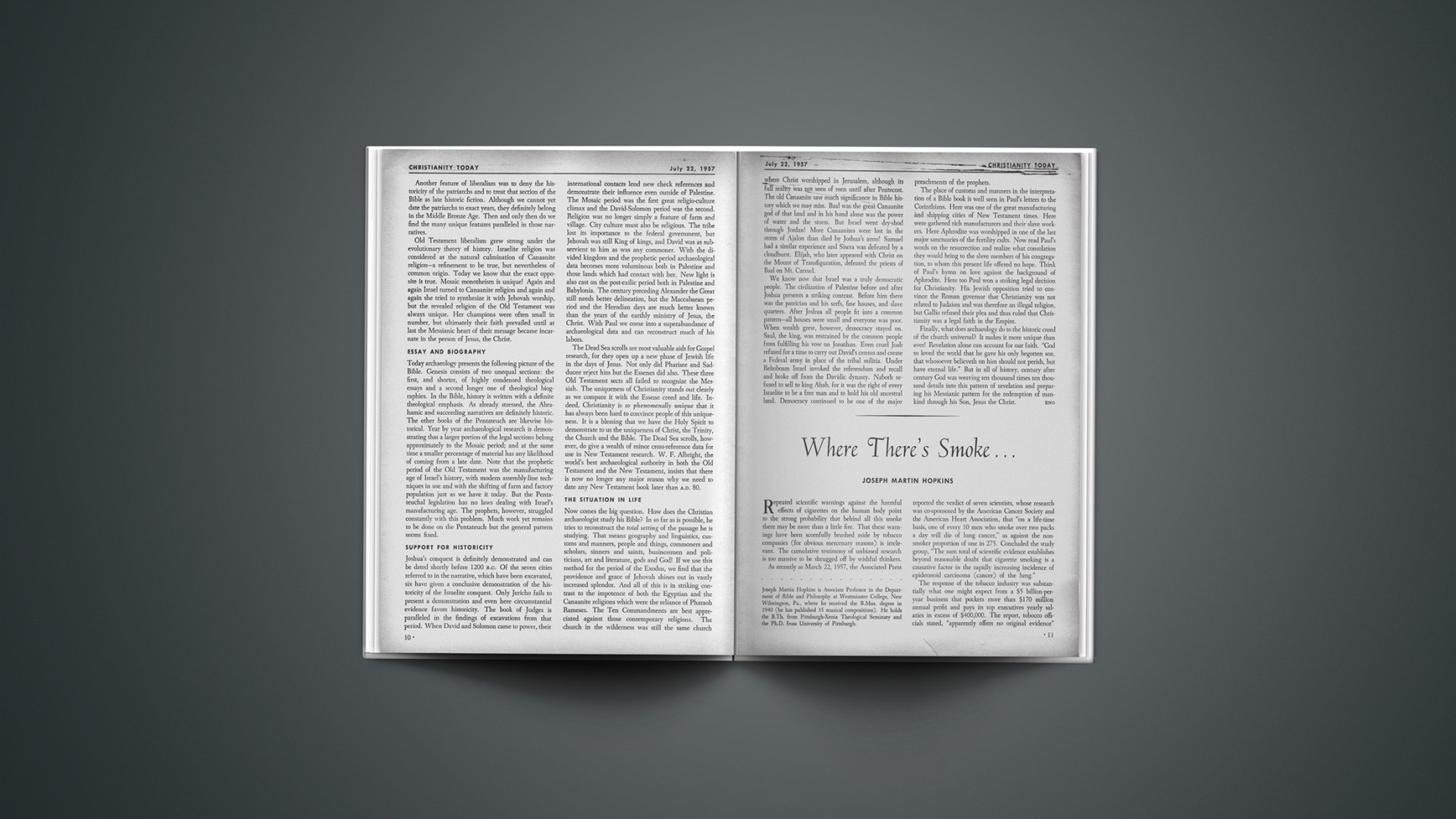Tillich Soteriology
Systematic Theology, Vol. 2, by Paul Tillich, University of Chicago Press, Chicago, 1957. $4.50.
This is decidedly the most readable book that Paul Tillich has yet published, due partly to the subject matter—the fall, sin, Christ and salvation—and partly to the fact that Tillich has found helpers who thoroughly understand and appreciate his views and who have ironed out his attempts to express himself in English. Tillich came to America at the age of 47 in 1933 and in spite of twenty-five years here does not have the same mastery of English as he does of his native language.
In his explanation of the fall Tillich speaks of man as first existing as essential being in the mind of God in a state of “dreaming innocence.” He denies that there ever was any state of conscious innocence or any golden age. As man exerted himself to come into existence he sinned—expressed unbelief, exerted pride and concupiscence—became estranged or separated from God and fell. In this fall he changed from the condition of essential being to that of existential being.
Tillich claims that man-kind is responsible for the fall even though it occurred before man came into consciousness. He draws an analogy from childhood to support his point and says, “the child upon growing into maturity affirms the state of estrangement in acts of freedom which imply responsibility and guilt” (p. 44). Such an explanation however, clearly fails to answer Rheinhold Niebuhr’s implication in The Theology of Paul Tillich that responsibility cannot be predicated of a fall which did not happen in history, nor his charge that this makes sin an ontological necessity in contrast to the Biblical view which makes it an historically responsible act (pp. 219, 222).
This second volume contains a full explanation of Tillich’s exegesis of Genesis 3 and shows how he forces the biblical account of the fall into the mould of his ontological system by what we can call half-way demythologization and which he calls “deliteralization” (p. 152).
From his view of original sin and a prehistorical fall Tillich proceeds on to a description of sin. He sees it as entailing unbelief, pride and concupiscence and adds to this the idea that certain polar tensions, present but always conquered in God—namely freedom and destiny, dynamics and form, individualization and participation—are in conflict in man. In spite of all this, plus a goodly admixture of the Kierkegaardian concept of Angst, Tillich fails to express the biblical view of sin in that he overlooks that it is, as the Westminster Shorter Catechism states, “Any want of conformity unto or transgression of the law of God.” For Tillich there cannot be any law as a revelation of the character of God because eternal verities and absolute truth are excluded by his definition of God as The Infinite and The Absolute. He has accepted the same definition of God as Mansel and Hamilton (Cf. Chas. Hodge, Systematic Theology, Vol. I, pp. 346–365) and must therefore insist that the Ten Commandments, and the words, commands and deeds of Jesus are only of relative value and do not hold for us. Any absolute, even absolute truth, would make God relative (Cf. Vol. I, p. 134).
Evil receives a necessary ontological existence in Tillich insofar as God is made dynamic by Non-Being (The Courage to Be, p. 179) and becomes an unavoidable necessity for creation insofar as it occurs in the state of “dreaming innocence” in the transition of man from potentiality to actuality (p. 44).
In his ontological view Tillich maintains the creation itself fell with man—he makes no clear distinction between material being and spiritual being insofar as both partake of the power of being—and sees the creation therefore as falling with man under the curse of sin. “Creation is good in its essential character. If actualized it falls into universal estrangement” (p. 44). The doctrine of creation and fall coincide (Cf. Vol. I, p. 255). Creation, including man and the material, is good as potential essential being, but is fallen and evil as actualized existential being.
At one point Tillich drops into the complete pantheism of Hegel and Schleiermacher as he writes concerning creation that “… God is eternally creative, that through himself he creates the world and through the world himself” (p. 147).
It is to be carefully noted that in this volume, as in volume I, Tillich never speaks of Christ as one who is divine and God in his own right, but rather as one who attained the place of “the Christ,” one who becomes “the Christ” by an act of absolute surrender which was consummated in the Cross, followed by a victory which was signified in the kerygma of the resurrection. The resurrection of Christ is not physical (p. 155), nor spiritual (p. 156), nor merely psychological (p. 156) but is an ecstatic experience by the early Christians of the concrete picture of Jesus of Nazareth, in which he became united in their minds with the reality of the New Birth in such way that he had, for them, the character of a spiritual presence (p. 157).
It is regrettable that in this volume—and surely it should have appeared under his discussion of the person of Christ—there is no clear statement of what Tillich means by his term “God-Manhood.”
The references to “God-Manhood” are not listed anywhere in the index and yet the term is found in this volume on such pages as p. 124, 127, 146, 159, and 169. Carefully studied, and looked upon metaphysically, the concept means that essential being in the mind of God (and man only existed potentially there, cf. p. 33) was taken into union with the second principle in God or the Logos (a principle and not a person) and then became united with a common man, Jesus of Nazareth, to form “Jesus who is the Christ.” Tillich rejects the Virgin Birth as an historical fact in the life of Jesus (p. 160). Looked at physically the concept “God-man” means that Jesus became “Jesus who is the Christ” by surrendering everything of self and becoming absolutely transparent to the Logos or the divine.
References to the two natures of Christ are entirely missing in the index, though the subject is dwelt upon at length on pages 42 f. and 147–48. On page 147 Tillich confines the term “divine nature” to his concept of God as beyond essence and existence and denies implicitly that Christ could have such a nature in that it is “that which makes God into God.” He therefore considers that it is questionable that the term can be applied to Christ in any meaningful way.
When he comes to the doctrine of salvation Tillich insists that God is reconciled concerning sin, from eternity past, apart from the Cross of Christ. He states that “the message of Christianity is that God … is eternally reconciled” (p. 169). “He does not need to be reconciled to man, but he asks man to be reconciled to him” (p. 93). Tillich insists that Christ is only the “ultimate criterion” or norm of every healing and saving process, and that it cannot be insisted that there is no saving power apart from him Cp. 167–8). So far as Tillich’s theory of the appearance of the New Being under the conditions of existence is concerned, any other man could have been the Savior of mankind if he had completely surrendered himself and all he was to God and had become absolutely transparent to the divine.
R. ALLAN KILLEN
Sermonic Substance
God Has the Answer, by H. Orton Wiley, Beacon Hill Press. $1.50.
If more preachers waited until they reached the high plateau of spiritual maturity attained by this author before attempting to publish their sermons far less paper, printer’s ink and people’s time and money would be wasted on trivial books. Whether or not this volume of eight sermons deserves to be called a great book, the discerning reader will recognize that the spiritual vigor and godly enthusiasm of the author could only belong to one who has long walked in intimate fellowship with God.
In the preface Dr. Wiley admits of a love for the study of Bible symbolism and of having from the beginning of his ministry cultivated the expository method of preaching. That he has gone a long way in attaining these noble objectives is quite evident. If more ministers could be prevailed upon to follow the example of this man of God far fewer church people would “be tossed to and fro, and carried about by every wind of doctrine.” These are not light sermons that lend themselves readily to the use of men not given to solid study. Rather—here is sermonic substance in abundance for the use of careful and conscientious students ever in search of better materials with which to enrich the spiritual diet of their flocks.
While the author indulges in the use of a few too many scholastic words and phrases common to the pedagogue and often emphasizes the view of sanctification peculiar to his own denomination these practices detract but slightly from the underlying value of the sermons. The happy combination of practical with scientific knowledge in the study and application of biblical symbolism furnishes the reader with a profusion of fresh truth for use in expository preaching and teaching. This book deserves wide distribution and study especially among ministers.
ERIC EDWIN PAULSON
True Perspective
The Typology of Scripture by Patrick Fairbairn. Zondervan, Grand Rapids, 1956.
He who deals at length with types and symbols without becoming an extremist is an exception to the rule. Patrick Fairbairn is the exception. Like the geologist who walks the Grand Canyon floor, he studies his subject at close range, but like the same scientist flying high above the Arizona wonder, he sees parts in their relationship to the whole and achieves true perspective.
There were typology students before Fairbairn’s day, and there have been many since, but his work stands out head and shoulders above that of all others. It rests upon sound interpretative principles and reasoned theological conclusions. The comparatively recent hermeneutical handbooks of Ramm and Berkhoff touch upon the Old Testament shadows which become living realities in the new dispensation, yet they no more than skim the surface. Fairbairn’s study has depth and possesses enduring qualities.
A type, says Fairbairn, necessitates a “resemblance in form or spirit” with “what answers to it under the Gospel,” but not just any similarity. The resemblance must be one designed of God “to prepare for the better things of the Gospel” (p. 46).
The author enunciates principles, analyzes individual passages and places them in the total setting of Scripture, and defends his exegesis against that of alternative interpretations. The student of Scripture who would understand the ceremonial institutions of the Old Testament or biblical prophecy, in whatever aspect, must not be a stranger to this Zondervan reprint.
BURTON L. GODDARD
World And Life View
The Basic Ideas of Calvinism, by H. Henry Meeter. Grand Rapids International, Grand Rapids. Fourth edition revised. $1.50 and $3.50.
Ordinarily, these days, you can learn a lot about a book just by noting its publisher and its friends. This book comes out of Grand Rapids. That usually means a point of view faithful to the historic reformed tradition. And this book is highly praised by such men as Louis Berkhof, H. H. Kuyper, H. J. Kuiper, J. R. Richardson and F. E. Mayer. To these, this reviewer can be expected to add very little.
Any book with a title such as this, however, needs defining, for Calvinism means many things to many people. Dr. Meeter does not set out to analyze Calvin’s own writings, nor is he interested in the pure theology of the Reformer. His interest is to present the social and political—especially the political—implications of Calvinism as it today is recognized as a world and life view. He writes much in the spirit of Dakin’s Calvinism.
This book is actually a treatise in political science. Three-fourths of it is devoted to Calvinism and culture, to the calvinistic view of the State, of civil liberty, of international law, of war. The first part lays the groundwork for the author’s principal concern by treating very briefly, but well, of Calvinism’s fundamental principle (the Sovereignty of God), its main theological points, its view of Revelation. Then, using Calvinism’s doctrine of Common Grace as a springboard, he launches into the political realm. As a matter of fact, the author confesses his disinterest in Calvinism as a religion, declaring that readers who want information along this line should turn to other authors.
If there is anything wrong with this book, it is at the point of the author’s understanding of Calvin’s doctrine of Common Grace. His view of this doctrine looms large in importance because, after all, the book is about human behavior, or the effect of Common Grace in human relations. Meeter believes that a Calvinist must view the natural man as totally depraved, with every constructive or beneficial work the result of common grace.
He understands this Common Grace as a sort of superimposed (not native) endowment which acts altogether as a restraining influence, by preventing his normal, altogether evil tendencies from dominating. This is an altogether negative approach to man’s constructive behavior which results from Meeter’s understanding of the doctrine of total depravity, an understanding which fails to take into account Calvin’s pointed references to the image of God as marred but not wholly destroyed in man. The distinction is important. Meeter’s view (that the imago dei is wholly destroyed) necessarily colors his writing. Were he altogether consistent, he would say that there can be no native love between a human father and son except by Common Grace, which acts as a restraining influence to control the parent’s natural inclination to strangle the boy.
But it is a good book.
G. AIKEN TAYLOR
New Translation
The Authentic New Testament, edited and translated from the Greek by Hugh J. Schonfield. Maps and Illustrations by J. F. Horrabin. Dennis Dobson, London, 1956. 25s.
Recent archaeological discoveries in the neighbourhood of the Dead Sea have aroused considerable interest among all who are concerned with Christian origins. Mr. Schonfield wants us to treat the documents of the New Testament with the same breathless excitement.
To enable us to do this he has produced a new translation in which, as he says in his preface, one can “approach these records as if they had recently been recovered from a cave in Palestine or from beneath the sands of Egypt” and thus “look at everything freshly and ask oneself, and try to answer, all kinds of exciting questions.”
Our translator, therefore, as an accomplished Rabbinic and Semitic scholar, has paid full attention to the essentially Jewish background to these writings and, taking into consideration the individual styles and viewpoints of the different authors, has endeavoured to give, in our own modern idiom, what he calls an “authentic New Testament,” i. e. one which should strike people today in much the same way as it struck its first readers many centuries ago. By “authentic” he does not mean to assert that his version is the only correct one, but that it does, as far as possible in a translation, give an accurate reflexion of the period in which the documents were written.
This involves the purging out of all “ecclesiastical bias” and the avoidance of all words and phrases which have, in the course of time, come to acquire a more or less stereotyped, technical meaning, a meaning which may be somewhat different from that of the original one. Thus he speaks of “immersion” not “baptism”, of “envoys” not “apostles”, of “exoneration” not “justification” and of “the community” not “the church”. This is salutary, but it is questionable whether, at this late date, such words as these can be entirely divested of the ideas and associations which have gathered around them with the growth of Christian thought and experience. This raises the whole question as to how far the Scriptures can be read without bias, and to what extent we are to be expected to project ourselves into the ideas and outlook of the latter part of the first century of our era before we can really understand them.
Mr. Schonfield speaks as a scholar and a Jew. He is concerned to show that Christianity fits closely into its Jewish environment and that there is much common ground between the two movements. This is an approach for which we may be grateful, for it represents a very different attitude to the New Testament on the part of Jewish people from that which has been in vogue all down the centuries (an attitude for which the Christian Church itself is largely to blame). We therefore welcome Mr. Schonfield’s version as an instance of the drawing together of Jews and Christians for the mutual enrichment of both parties. We are grateful too for the superb way in which this version has been set out. Chapter and verse divisions have been replaced by more intelligible paragraphing.
The individual books, each provided with a brief introduction, are rearranged with Acts following immediately after Luke’s Gospel and the Johannine literature placed together at the end, to give only two examples. The four letters or fragments of letters believed by some to lie behind our 1 and 2 Corinthians are clearly indicated here. But your reviewer is not too happy about the dating of some of the books which seems to be based on ideas of 19th century liberalism.
The translation itself however is extremely well done. It ought to fulfill the author’s earnest desire “to persuade some, no matter what their creed or convictions may be, that the New Testament is well worth reading.”
But there is more to it than that. At the close of his general introduction Mr. Schonfield quotes the words of the Christian scholar, George Sale, who, in presenting his English version of the Mohammedan scriptures, wrote: “I have endeavoured to do the original impartial justice; not having, to the best of my knowledge, represented it, in any one instance, either better or worse than it really is.” Which reminds us that the really authentic New Testament is not any “ecclesiastical” version, nor even the version of H. J. Schonfield, but that which “is written, not with ink, but with the Spirit of the Living God; not in tables of stone, but in the fleshly tables of the heart.”
L. E. H. STEPHENS-HODGE
Christian Reformed
“… I Will Build My Church”, by Thea B. Van Halsema. Grand Rapids International Publications, $2.95.
It was while she was serving on the Program Committee for the Christian Reformed Centennial of this year that Mrs. Van Halsema, known already to readers for her articles for young people, became interested in preparing this volume. With her background as daughter of Dr. Clarence Bouma; her training at Grand Rapids Christian High School, Calvin College and Western Reserve University; her experience with people as a social service case worker; her interest in children as a mother of four; and her present concern for the church as the wife of one of its ministers—it is doubted that anyone could be better fitted for this task.
“… I Will Build My Church” was written to present to the young people of the Christian Reformed Church a picture of their own church and a picture of the Church of Christ as God has been building it ever since Calvary. It was written to thrill them with their past and inspire them for a greater future.
In addition to significant historical material the author presents details that provide human interest for the young reader. In a few bold strokes the historical figures become flesh and blood. Our respect for the hardy Christians who founded the church and weathered the early years is heightened with Mrs. Van Halsema’s presentation. She frankly admits failings of the church and at the same time helps those of us who are on the outside to understand such things as its exclusiveness in the past, while encouraging us with its declared purpose to reach out more to those also who are neighbors. The book concludes in this vein:
“Speak, says God to the church called Christian Reformed. Speak for me to the people of America. Go on speaking far away in Africa and the Orient, but speak now also to the neighbors whose homes are next to your own. And while you speak and work, hold fast to the truth, which is my Word.
“So I will be with you and bless you, and make you to be a blessing. Through you also I will build my church.”
Young people outside the Christian Reformed Church should read the section that deals with general church history. It would provide an excellent introduction for those to whom Augustine, Luther and Calvin are but names. The rest of the book, too, would be splendid for the young person’s general education and insight into the beliefs and history of another communion, However, some parts are necessarily pretty well peppered with dates and details which limit its appeal largely to readers within the Christian Reformed Church.
This is a fine piece of book manship, greatly enhanced by the virile and striking black and white drawings by the successful young illustrator and author, Dirk Gringhuis.
NORMA R. ELLIS
Christian Martyr
Nicholas Ridley, by Jasper Ridley. Longmans, London. 25s.
What possible interest can the life-story of an English bishop of the 16th century have for readers of CHRISTIANITY TODAY in the U. S. A.? Never were the lessons it teaches more relevant than they are today.
It is a classic illustration of the danger to the Gospel when the church departs from the Bible; of the inevitable reformation which is needed when Holy Scripture is restored; of the vital importance of ensuring that the outward expression of worship should be consistent with scriptural doctrine. Ridley’s story is well told by a descendant who betrays no enthusiasm for his ancestor though he arouses it in his readers. Ridley’s progress from being a practising Roman Catholic to that of a convinced Protestant begins with his introduction to the Bible which he seized and devoured (he learned by heart all the Epistles in Erasmus’ Greek Testament). He was led first to reject the papal supremacy, then slowly and perhaps reluctantly to accept the reformed doctrines and finally to abandon the ritual and practices associated with Roman teaching. The new teaching was given the people in the English Prayer Book and later enshrined in the Articles.
But suddenly the progress of the Reformation was arrested by the death of Edward VI and the accession of Mary. Everything went into reverse. It was not enough that the new doctrines and practices be banned and the old restored; the Reformers must denounce the new faith and declare their allegiance to the old. It was a tremendous test for Ridley and his fellows. The alternatives were, as he put it, “Turn or burn.” He decided to bum, but not before he had proved in open debate the superiority both of his scholarship over that of his enemies and of the scriptural doctrines over those of Rome. At the stake he told the people that he was more honoured at the prospect of martyrdom in Christ’s quarrel than ever he had been by his elevation to the Sees of Rochester and London, or by his selection as Bishop of Durham. Through the clumsiness of his executioners his death was far more horrible than it need have been. In his agony he cried “I cannot burn,” but as his fellow-sufferer Latimer assured him he lit a candle which by God’s grace should never be put out. It is because it is in danger of being put out today that the lessons of the book should be read, marked and learned.
T. G. MOHAN

